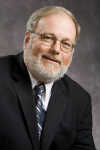Oberlin, Kansas, native was one of nation's leading experts on public policy, Indian law

BERKELEY, California -- Oberlin native Philip P. Frickey of Moraga, California, a professor at University of California Berkeley and one of the nation's foremost experts on public law and federal Indian law and policy, died Sunday, July 11. He was 57.
A law school professor for 27 years, Frickey was the co-author of popular casebooks on legislation, constitutional law, and Indian law. He also volunteered his skills outside the scholastic arena--working with the Native American Rights Fund and National Congress of American Indians--and writing amicus briefs on their behalf in U.S. Supreme Court cases.
"I've never known anyone whose judgment was so highly respected by his colleagues," said Berkeley Law Professor Dan Farber, who co-authored two books and eight articles with Frickey and called him "the nation's leading authority on Indian Law."
Frickey, whose career path was influenced by a clerkship with U.S. Supreme Court Justice Thurgood Marshall, started his teaching career at University of Kansas Law School. He went to Berkeley Law in 2000 after 17 years at the University of Minnesota Law School. In addition to his scholastic and teaching achievements, Frickey chaired Berkeley Law's faculty appointments committee.
"Whatever joy and success I've had as dean, there is simply no member of the faculty to whom I own more than Phil," Berkeley Dean Christopher Edley said in an obituary posted on the school's Web pages. "I've learned an enormous amount from him. And in the history of this school, only a handful have created a comparable institutional legacy."
A full-day symposium to celebrate Frickey's scholarship and teaching was held at Berkeley Law on April 24, 2009. The event drew top academics from across the country; papers from the event will soon be published in a special issue of the California Law Review. At that time, two student funds at Berkeley were created in Frickey's honor, and a fund in his honor also was established with Kansas University Endowment Association to support the Tribal Law and Government Program at University of Kansas Law School.
Alice Bodnar, a practicing attorney and former student of Frickey, who has worked with tribes to develop renewable energy projects on Indian land, said Frickey was "brilliant, a very good teacher, and someone who cared about what his students think. I'd leave his class every day excited about the law."
In 1988, Frickey and Yale Law School Professor William N. Eskridge, Jr. co-authored "Cases and Materials on Legislation: Statutes and the Creation of Public Policy." Multiple editions later, Farber said the casebook "is commonly considered to have created the modern field of Legislation scholarship."
Frickey received the Distinguished Service Award from University of Kansas in 2006, and in 2009 won both the Lawrence R. Baca Lifetime Achievement Award from the Federal Bar Association's Indian Law section and Berkeley Law's Rutter Award for Teaching Distinction.
Born on June 29, 1953 in Oberlin, Kansas, Frickey was the son of Carl L. and Doreen L. (Nitsch) Frickey. Phil graduated from Decatur Community High School in Oberlin in 1971, and received his undergraduate degree from the University of Kansas in 1975, where he earned Phil Beta Kappa honors his junior year. He then went to the University of Michigan Law School, became editor-in-chief of the Michigan Law Review, and graduated in 1978 both magna cum laude and Order of the Coif.
After law school, Frickey clerked for Judge John Minor Wisdom of the U.S. Court of Appeals for the 5th Circuit. Frickey never expected to focus on Indian law, but while clerking for Marshall several Indian law cases came before the Supreme Court and he "became immersed in my research and increasingly fascinated with the subject matter."
Following his clerkship, Frickey returned home to Kansas when his mother became ill. He taught Torts and a Constitutional Law seminar for one semester at the Kansas University School of Law. "That kind of ruined me for law practice," Frickey said, "because teaching was such a wonderful experience."
He practiced law for three years in Washington, D.C. before joining the University of Minnesota Law School faculty. Six years into his appointment at Berkeley Law, Frickey was appointed to its Alexander F. and May T. Morrison Chair.
"In terms of his scholarship, Phil was a major figure in constitutional law," Farber said. "But he was probably best known among legal academics for his work on theories of statutory interpretation."
Frickey also saw a glaring need for young legal talent to work on Indian law issues. "Indian law is an incredibly difficult legal puzzle and frequently incoherent," he said. "It hasn't been well-developed intellectually, and of course the social consequences of that are quite stark. To give students an opportunity to contribute in this area is both important and gratifying."
Frickey is survived by Mary Ann Bernard, his wife of 27 years, and two children, Alexander Bernard Frickey and Elizabeth Bernard Frickey. He is also survived by his brother, Charles Frickey of Oberlin, Kansas; his sister, Michele Scherzer of Rockport, Texas; and nine nieces and nephews.
A memorial service will be held in Oberlin, Kansas, Saturday July 31 at 2:00 p.m. at Faith Lutheran Church. His family asks that in lieu of flowers, donations be made to the Philip P. Frickey Indian Law Fund at Kansas University Endowment Association, P.O. Box 928, Lawrence, KS 66044-0928, or http://www.kuendowment.org/givenow (purpose of gift Philip P. Frickey Indian Law Fund).
